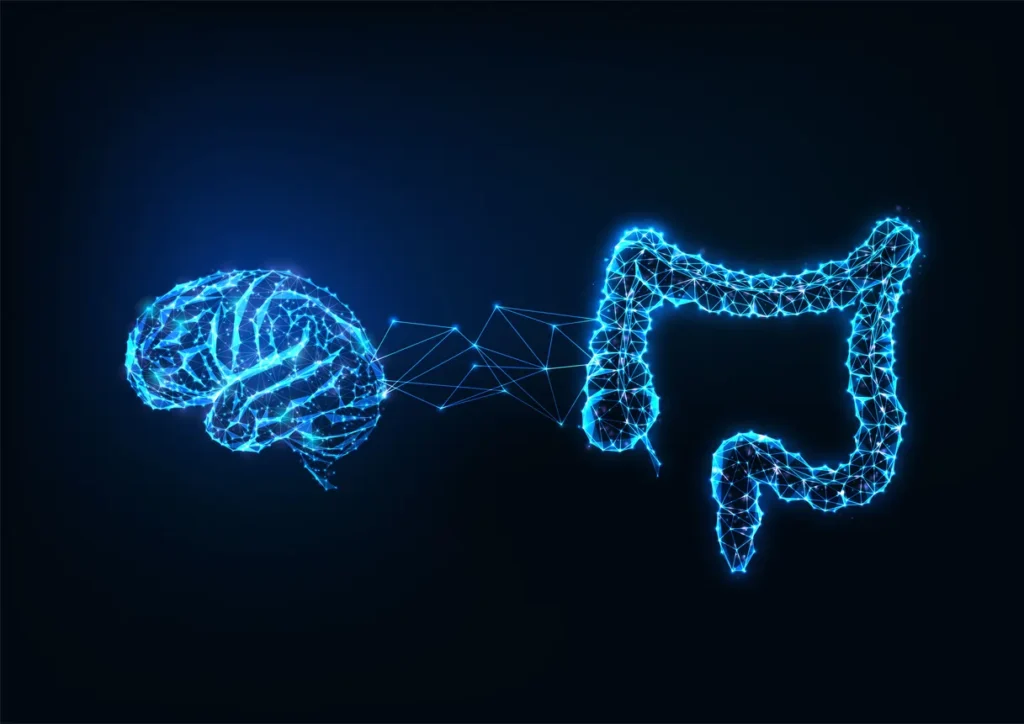
Story at-a-glance
- The gut-brain axis represents a powerful influence on children’s cognitive function and behavior, offering crucial insights for those with learning, attention, and emotional regulation challenges.
- The digestive tract contains its own complex neural network—the enteric nervous system (ENS)—with over 500 million neurons, leading scientists to refer to the gut as a “second brain.”
- Communication between the gut and brain occurs through multiple pathways: the vagus nerve, immune system messaging, microbial metabolites, and the endocrine system.
- The gut microbiome—trillions of microorganisms in the digestive tract—produces neurotransmitters like serotonin (90% is produced in the gut), GABA, and dopamine that significantly influence mood, focus, and learning.
- Research shows direct connections between gut health and cognitive function, with studies linking imbalanced gut microbiomes to reduced executive function, language development issues, and attention difficulties.
- The gut-brain connection also affects emotional regulation, with studies showing certain probiotic strains can reduce anxiety symptoms in children and influence social behavior.
- Warning signs of gut-brain dysfunction include physical symptoms (digestive discomfort, food sensitivities, irregular bowel movements) and cognitive/behavioral signs (mood swings, brain fog, inconsistent academic performance).
- Common disruptors of children’s gut health include dietary factors (processed foods, low fiber intake, food additives), medications (antibiotics, acid reducers, NSAIDs), and environmental factors (toxins, chronic stress, insufficient nature exposure).
- Supporting gut health involves dietary approaches (diverse plant foods, fermented foods, fiber-rich foods), lifestyle factors (prioritizing sleep, regular physical activity, stress management), and sometimes targeted supplements.
- Case studies demonstrate how addressing gut health has improved attention and reduced hyperactivity, decreased anxiety, and enhanced language processing and social communication in children.
- A collaborative approach with healthcare providers like functional medicine practitioners, integrative pediatricians, or pediatric nutritionists can help identify and address specific gut-brain issues.
- While not replacing educational interventions and traditional therapies, addressing gut health represents a complementary approach that may significantly enhance outcomes for many children with learning and behavioral challenges.
As parents of children with learning or behavioral challenges, we often focus our attention on teaching strategies, classroom accommodations, and traditional therapies. However, emerging research points to a surprisingly powerful influence on our children’s cognitive function and behavior that originates far from the brain itself—the digestive system. This connection, known as the gut-brain axis, may hold critical insights for understanding and supporting children who struggle with learning, attention, and emotional regulation.
The Gut as a "Second Brain": Understanding the Enteric Nervous System
What many parents don’t realize is that the digestive tract contains its own complex neural network called the enteric nervous system (ENS), which houses over 500 million neurons—more than in the spinal cord. This extensive neural network has led scientists to refer to the gut as a “second brain.”
Dr. Michael Gershon, author of “The Second Brain” and chairman of the Department of Anatomy and Cell Biology at Columbia University, explains: “The gut can work independently of any control by the brain in your head—it’s functioning as a second brain. It’s another independent center of integrative neural activity.”
This second brain doesn’t “think” in the traditional sense, but it does communicate extensively with our primary brain through multiple pathways:
- The Vagus Nerve Highway: The vagus nerve serves as a direct communication channel between the gut and the brain, transmitting signals in both directions.
- Immune System Messaging: The gut houses approximately 70-80% of our immune system cells, which produce signaling molecules that affect brain function.
- Microbial Metabolites: The trillions of bacteria in our gut produce neurotransmitters and other compounds that influence brain activity.
- The Endocrine Pathway: Gut hormones can enter the bloodstream and affect brain function.
The Gut Microbiome: Trillions of Tiny Influencers
Perhaps most fascinating is the role of the gut microbiome—the vast community of microorganisms residing in our digestive tract. These microbes don’t just help digest food; they actively produce neurotransmitters and other substances that influence brain development, mood, and cognitive function.
Key Neurotransmitters Produced by Gut Bacteria
- Serotonin: Often called the “happy chemical,” approximately 90% of the body’s serotonin is produced in the gut. This neurotransmitter influences mood, social behavior, sleep, and learning.
- GABA (Gamma-aminobutyric acid): The primary inhibitory neurotransmitter that helps calm brain activity and is crucial for focus and emotional regulation.
- Dopamine: Essential for motivation, reward, and attention—all critical factors in learning.
Research published in Nature Microbiology (2020) demonstrated that gut bacteria composition in children correlates with cognitive performance, with specific bacterial species associated with better memory, attention, and language processing.
How Gut Health Impacts Learning and Behavior
- Cognitive Function and Learning Abilities
Emerging research shows direct connections between gut health and various aspects of learning:
- Executive Function: A study published in Behavioral Brain Research (2019) found that children with imbalanced gut microbiomes showed reduced executive function capabilities, including working memory, cognitive flexibility, and inhibitory control—skills essential for academic success.
- Language Development: Research from the University of Alberta (2021) found correlations between gut microbiome diversity and language development in young children.
- Focus and Attention: A growing body of evidence suggests that inflammatory responses originating in the gut can contribute to attention difficulties. Studies have found that children with ADHD often have distinct gut microbiome patterns compared to neurotypical peers.
Dr. Emeran Mayer, professor of medicine at UCLA and author of “The Mind-Gut Connection,” notes: “We’ve found that altering the balance and diversity of gut microbiota can lead to measurable changes in cognition and behavior in both animal models and humans.”
- Mood Regulation and Emotional Behavior
The gut-brain connection also profoundly affects children’s emotional well-being and behavior:
- Anxiety and Stress Responses: Research in the Journal of Psychiatric Research (2018) found that certain probiotic strains reduced anxiety symptoms in children, potentially by modulating the stress response system.
- Mood Stability: Gut inflammation can trigger the release of cytokines that affect brain regions responsible for mood regulation, potentially contributing to emotional volatility.
- Social Behavior: Studies in mice have shown that altering gut bacteria can change social behavior, with implications for understanding social difficulties in children with certain neurodevelopmental conditions.
A landmark study published in Cell (2019) demonstrated that germ-free mice (lacking gut microbiomes) showed significant social deficits and behavioral abnormalities, which were partially reversible when gut bacteria were introduced.
Warning Signs of Gut-Brain Dysfunction in Children
Parents should be alert to these potential indicators that gut health may be affecting their child’s learning and behavior:
Physical Signs
- Frequent stomach aches, bloating, or digestive discomfort
- Food sensitivities or allergies
- Irregular bowel movements (constipation or diarrhea)
- Frequent illness due to compromised immunity
- Skin issues like eczema (which often correlates with gut inflammation)
- Sleep disturbances
Behavioral and Cognitive Signs
- Sudden mood swings or emotional volatility
- “Brain fog” or difficulty concentrating
- Inconsistent academic performance (“good days and bad days”)
- Increased hyperactivity after certain foods
- Fatigue that affects learning stamina
- Heightened anxiety or worry
Common Disruptors of Children's Gut Health
Several factors in modern life can negatively impact the gut microbiome and gut-brain communication in children:
- Dietary Factors
- Processed Foods and Added Sugars: A diet high in processed foods and sugars promotes inflammation and the growth of less beneficial gut bacteria.
- Low Fiber Intake: Dietary fiber feeds beneficial gut bacteria. The average American child consumes less than half the recommended fiber intake.
- Food Additives: Common additives like artificial colors, preservatives, and emulsifiers have been shown to alter gut barrier function and microbiome composition.
Research in Frontiers in Nutrition (2021) found that children consuming a “Western pattern diet” high in processed foods had less diverse microbiomes and lower cognitive flexibility scores compared to children eating more whole foods.
- Medications
- Antibiotics: While sometimes necessary, antibiotics don’t discriminate between harmful and beneficial bacteria. A study in Nature Communications (2018) found that even a single course of antibiotics can alter the gut microbiome for up to a year.
- Proton Pump Inhibitors and Acid Reducers: These medications change gut pH, which affects which bacterial species can thrive.
- Non-Steroidal Anti-Inflammatory Drugs (NSAIDs): Regular use can increase intestinal permeability.
- Environmental Factors
- Environmental Toxins: Pesticides, household chemicals, and plasticizers can disrupt the gut microbiome.
- Chronic Stress: Stress alters gut motility, permeability, and microbial composition through the gut-brain axis.
- Insufficient Exposure to Nature: Research suggests that limited exposure to diverse microbes in natural environments may contribute to less robust microbiomes.
Supporting Gut Health to Improve Learning and Behavior
Dietary Approaches
- Increase Diversity of Plant Foods: Each different plant food nourishes different beneficial gut bacteria. Dr. Christopher Gardner of Stanford University recommends aiming for 30 different plant foods weekly.
- Include Fermented Foods: Yogurt, kefir, sauerkraut, and other fermented foods contain beneficial live bacteria.
- Focus on Fiber-Rich Foods: Vegetables, fruits, legumes, nuts, seeds, and whole grains feed beneficial gut bacteria.
- Consider an Elimination Diet: Under professional guidance, temporarily removing common inflammatory foods (like gluten or dairy) and monitoring behavioral and cognitive changes can identify problem foods.
- Reduce Ultra-Processed Foods: Minimize foods with artificial additives, preservatives, and high amounts of refined sugar.
A study in Nutritional Neuroscience (2020) found that children who switched from a highly processed diet to one rich in whole foods showed improvements in attention and working memory after just 8 weeks.
Lifestyle Factors
- Prioritize Sleep: Poor sleep disrupts the gut microbiome, creating a vicious cycle as gut health also affects sleep quality.
- Encourage Regular Physical Activity: Exercise promotes microbial diversity and healthy gut function.
- Manage Stress: Incorporate age-appropriate stress-reduction techniques like deep breathing, mindfulness activities, or yoga.
- Increase Time in Nature: Exposure to diverse environmental microbes helps establish a robust gut ecosystem.
Targeted Supplements
When diet alone isn’t sufficient, some supplements may support gut-brain health:
- Probiotics: Specific strains have been researched for cognitive and behavioral effects. For example, Lactobacillus rhamnosus has been shown to reduce anxiety behaviors, while Bifidobacterium longum has demonstrated benefits for memory.
- Prebiotics: These compounds, including specific types of fiber, feed beneficial gut bacteria. Galacto-oligosaccharides (GOS) have been studied for their effects on reducing anxiety and improving cognitive function.
- Omega-3 Fatty Acids: These essential fats support both gut and brain health, with studies showing benefits for attention and learning.
- Digestive Enzymes: For children with specific digestive challenges, supplemental enzymes may improve nutrient absorption and reduce digestive discomfort.
Always consult with a healthcare provider before starting any supplement regimen, as quality, dosage, and specific strains matter significantly.
Case Studies: Gut-Directed Approaches to Learning and Behavioral Challenges
Case 1: Improving Attention and Reducing Hyperactivity
Eight-year-old Ethan struggled with attention and hyperactivity in the classroom. Comprehensive stool testing revealed significant dysbiosis (imbalance in gut bacteria) and elevations in inflammatory markers. After three months of dietary changes, including removing processed foods, adding fermented foods, and supplementing with specific probiotic strains, his parents and teachers reported a 60% improvement in attention span and significantly reduced hyperactive behaviors.
Case 2: Addressing Anxiety and Emotional Regulation
Ten-year-old Maya experienced anxiety that interfered with classroom participation and test performance. Testing showed increased intestinal permeability (often called “leaky gut”). After identifying and removing trigger foods, supporting gut healing with key nutrients, and addressing bacterial imbalances, her anxiety levels decreased substantially. Her teacher noted she began raising her hand in class and approaching tests with new confidence.
Case 3: Supporting Language Processing and Social Communication
Six-year-old Noah had challenges with language processing and social communication. Specialized testing revealed significant imbalances in gut bacteria species associated with neurotransmitter production. A targeted protocol to restore microbial balance, reduce inflammation, and support nutrient absorption led to gradual improvements in his verbal communication and social interactions over a six-month period.
Collaborating with Healthcare Providers
When exploring gut-brain connections for your child, consider working with:
- Functional Medicine Practitioners: These providers specialize in identifying and addressing root causes of health issues, including gut-brain connections.
- Integrative Pediatricians: Physicians who combine conventional medicine with evidence-based complementary approaches.
- Pediatric Nutritionists: Specialists in childhood nutrition who can help implement dietary changes appropriately.
- Gastroenterologists: For children with significant digestive symptoms, a specialist may be needed for comprehensive evaluation.
Useful testing approaches may include:
- Comprehensive stool analysis
- Food sensitivity testing
- Nutrient level assessment
- Organic acid testing
- Intestinal permeability evaluation
Conclusion: The Gut as a Pathway to Learning Success
The emerging science of the gut-brain connection offers new hope for children with learning and behavioral challenges. While not a replacement for educational interventions and traditional therapies, addressing gut health represents a complementary approach that may significantly enhance outcomes for many children.
By understanding that the brain doesn’t function in isolation—but rather as part of an integrated system deeply connected to gut health—parents and practitioners can explore new pathways to support children’s cognitive and emotional well-being. For many families, this holistic perspective has opened doors to improvements that weren’t possible through conventional approaches alone.
As this field continues to evolve, the message becoming increasingly clear is that nurturing our children’s “second brain” may be just as important as supporting the one in their head.
References
- Cryan, J. F., O’Riordan, K. J., Cowan, C. S. M., Sandhu, K. V., Bastiaanssen, T. F. S., Boehme, M., Codagnone, M. G., Cussotto, S., Fulling, C., Golubeva, A. V., Guzzetta, K. E., Jaggar, M., Long-Smith, C. M., Lyte, J. M., Martin, J. A., Molinero-Perez, A., Moloney, G., Morelli, E., Morillas, E., … Dinan, T. G. (2019). The Microbiota-Gut-Brain Axis. Physiological Reviews, 99(4), 1877–2013.
- Mayer, E. A. (2011). Gut feelings: the emerging biology of gut-brain communication. Nature Reviews Neuroscience, 12(8), 453–466.
- Galland, L. (2014). The gut microbiome and the brain. Journal of Medicinal Food, 17(12), 1261–1272.
- Chu, C., Murdock, M. H., Jing, D., Won, T. H., Chung, H., Kressel, A. M., Tsaava, T., Addorisio, M. E., Putzel, G. G., Zhou, L., Bessman, N. J., Yang, R., Moriyama, S., Parkhurst, C. N., Li, A., Meyer, H. C., Teng, F., Chavan, S. S., Tracey, K. J., … & Chang, C. B. (2019). The microbiota regulate neuronal function and fear extinction learning. Nature, 574(7779), 543–548.
- Vuong, H. E., Yano, J. M., Fung, T. C., & Hsiao, E. Y. (2017). The Microbiome and Host Behavior. Annual Review of Neuroscience, 40, 21–49.
- Proctor, C., Thiennimitr, P., Chattipakorn, N., & Chattipakorn, S. C. (2017). Diet, gut microbiota and cognition. Metabolic Brain Disease, 32(1), 1–17.
- Liu, S., Gao, J., Zhu, M., Liu, K., & Zhang, H. L. (2020). Gut Microbiota and Dysbiosis in Alzheimer’s Disease: Implications for Pathogenesis and Treatment. Molecular Neurobiology, 57(12), 5026–5043.
- Tengeler, A. C., Dam, S. A., Wiesmann, M., Naaijen, J., van Bodegom, M., Belzer, C., Dederen, P. J., Verweij, V., Franke, B., Kozicz, T., Arias Vasquez, A., & Kiliaan, A. J. (2020). Gut microbiota from persons with attention-deficit/hyperactivity disorder affects the brain in mice. Microbiome, 8(1), 44.
- Carlson, A. L., Xia, K., Azcarate-Peril, M. A., Goldman, B. D., Ahn, M., Styner, M. A., Thompson, A. L., Geng, X., Gilmore, J. H., & Knickmeyer, R. C. (2018). Infant Gut Microbiome Associated With Cognitive Development. Biological Psychiatry, 83(2), 148–159.
- Fung, T. C., Olson, C. A., & Hsiao, E. Y. (2017). Interactions between the microbiota, immune and nervous systems in health and disease. Nature Neuroscience, 20(2), 145–155.
Note: This blog post is intended for educational purposes only. While the information presented is based on scientific research, individual situations vary. Please consult with qualified professionals for proper assessment and individualized recommendations.



